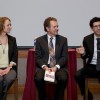Panelists Discuss the Public’s Perception of Science
The Pell Center’s presentation earlier this month, “Science Under Attack: Politics, Policy, and Science in America” discussed the public’s perception of science, and focused mainly on global warming. The presentation featured Suzanne Shaw, director of communications at the Union of Concerned Scientists and Todd Anthony Bianco, principal policy associate at the Rhode Island Public Utilities Commission.
Shaw started off by discussing the public’s beliefs and mentioned that most Americans trust scientists, and therefore, most Americans trust science. Despite this, many still believe in ESP, ghosts, and astrology. Clearly there is a mix, or a conflict of beliefs for many Americans.
This conflict reaches beyond personal and private choices and into the political arena. Shaw mentioned that both Democrats and Republicans deny science in some policies. For example, most Republicans do not accept the idea of global warming, and Democrats tend to reject vaccines and health amenities such as fluoride in water.
Individuals, as well as political parties, often neglect scientific fact in decisions for several reasons. Shaw brought up how tobacco companies hide scientific facts from the public in order to make a profit off their merchandise. The public was unaware of the truth about tobacco for a significant amount of time, and therefore their choice to indulge in the product was not an informed decision. Because of profit or lack of education, science often gets pushed aside.
In this vein, Bianco outlined why people might ignore science. Bianco relayed to the audience that ignoring science is often a choice, because people incorporate their opinions and feelings into their decision.
To illustrate this idea, Bianco used the following example:
On a game show that includes participants choosing a door with the hope of finding the prize, participants will most likely remain with their first choice door instead of switching to another door when offered the chance to switch.
Bianco insists that most would remain with their first choice, even if encouraged to switch because of an increased mathematical probability of success.
People are more likely to trust their first instinct and follow their gut, often making change difficult. Bianco related this to global warming, saying how a change in lifestyle is necessary to counter act this problem, but extremely difficult. As a result, persuading people to believe in global warming is also problematic. The doubling of CO2 in the atmosphere produces about an increase of 1o F change in the climate. Although one degree (Fahrenheit?) does not pose horrific consequences, Bianco warned that a two or three degree raise is the beginning of dangerous territory.
Both Shaw and Bianco clearly advocated for a change in lifestyle to accept the scientifically proven facts. The attendance at the panel presentation proves that there are people who are willing to listen and to learn the science—rusting in choosing “the other door” might be the start of a brighter day in the reversal of not just the public’s opinion of global warming, but also their stances on other significant policy issues.

